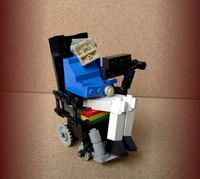- Posts: 672
- Thank you received: 51
Cure hope over diabetes therapy
- Able_Here_Team
-
 Topic Author
Topic Author
- Offline
- Moderator
-

Less
More
18 years 2 weeks ago #2139
by Able_Here_Team
Cure hope over diabetes therapy was created by Able_Here_Team
A pioneering treatment for diabetes is being rolled out across the country with experts believing it could eventually lead to a cure. Six centres are receiving nearly £10m of government funding to offer transplants of insulin-producing cells. The technique has been used on a handful of patients already to reduce the risks of coma-inducing blood sugar attacks in people with type 1 diabetes. Experts hope the therapy can be refined in the future to offer a complete cure. People with type 1 diabetes do not produce enough insulin, which means they have to rely on injections of the hormone.
There are about 250,000 people with the condition, which usually develops in childhood and is unconnected with lifestyle factors such as obesity unlike the type 2 version of the disease. The procedure involves obtaining cells - known as islet cells - from the pancreas of a dead donor and injecting them into the patient's liver. Once there, the cells get to work producing insulin.
However, the patients need to take immunosuppressant drugs for the rest of their lives and it is likely re-transplants will be likely in the future as doctors do not expect the hypoglycaemia protection to last for ever. The government-funding will mean many more patients will be able to benefit from the technique, with up to 20 transplants planned in the first year before the numbers are gradually built up to about 80. From April, the Department of Health will fund two laboratories - in London and Oxford - to receive donor pancreases and prepare the cells for transplantation. The labs will be able to provide the cells to six transplant centres based at the Oxford Radcliffe, Newcastle-up-on Tyne, North Bristol, Central Manchester, Kings College and Royal Free NHS trusts.
Extreme cases
It will mean in time the 2,000 patients at risk of hypoglycaemia will be able to get the treatment if needed. The only alternative at the moment is to have a complete pancreatic transplant, but that is only ever done in the most extreme cases. Professor Stephanie Amiel, a diabetes expert at King's College Hospital, said \"Allowing King's and the other centres to continue to offer this life-changing treatment will have enormous benefit for those patients who are suitable for islet transplantation in its present form. \"It will also allow the UK to develop the technique to be suitable for more people with type 1 diabetes and may, in time, lead to a 'cure'.\" Diabetes UK chief executive Douglas Smallwood added: \"The decision to fund this programme will be life-changing for some people. \"Resolving the worst cases could save the NHS a significant amount of money, as hypoglycaemic attacks cost £15m a year in hospitalisations and ambulances alone.
There are about 250,000 people with the condition, which usually develops in childhood and is unconnected with lifestyle factors such as obesity unlike the type 2 version of the disease. The procedure involves obtaining cells - known as islet cells - from the pancreas of a dead donor and injecting them into the patient's liver. Once there, the cells get to work producing insulin.
However, the patients need to take immunosuppressant drugs for the rest of their lives and it is likely re-transplants will be likely in the future as doctors do not expect the hypoglycaemia protection to last for ever. The government-funding will mean many more patients will be able to benefit from the technique, with up to 20 transplants planned in the first year before the numbers are gradually built up to about 80. From April, the Department of Health will fund two laboratories - in London and Oxford - to receive donor pancreases and prepare the cells for transplantation. The labs will be able to provide the cells to six transplant centres based at the Oxford Radcliffe, Newcastle-up-on Tyne, North Bristol, Central Manchester, Kings College and Royal Free NHS trusts.
Extreme cases
It will mean in time the 2,000 patients at risk of hypoglycaemia will be able to get the treatment if needed. The only alternative at the moment is to have a complete pancreatic transplant, but that is only ever done in the most extreme cases. Professor Stephanie Amiel, a diabetes expert at King's College Hospital, said \"Allowing King's and the other centres to continue to offer this life-changing treatment will have enormous benefit for those patients who are suitable for islet transplantation in its present form. \"It will also allow the UK to develop the technique to be suitable for more people with type 1 diabetes and may, in time, lead to a 'cure'.\" Diabetes UK chief executive Douglas Smallwood added: \"The decision to fund this programme will be life-changing for some people. \"Resolving the worst cases could save the NHS a significant amount of money, as hypoglycaemic attacks cost £15m a year in hospitalisations and ambulances alone.
Please Log in or Create an account to join the conversation.
Moderators: Able_Here_Team
Time to create page: 0.188 seconds
